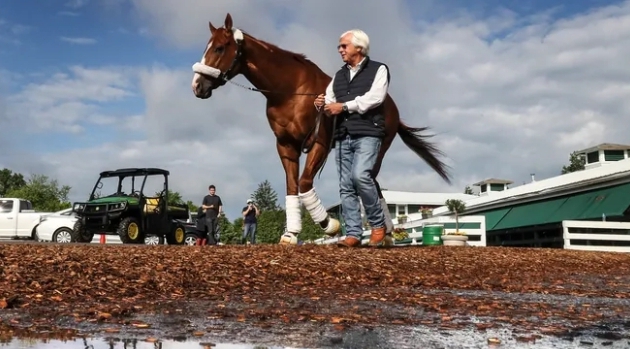Churchill Downs Lifts Bob Baffert’s Ban: Implications for Pete Rose’s MLB Case
In a recent and notable development, Churchill Downs has lifted the ban imposed on prominent horse trainer Bob Baffert. This decision marks a significant shift in how sports organizations address past infractions and could have broader implications for figures like Pete Rose, who remains banned from Major League Baseball (MLB).

Bob Baffert, a legendary trainer known for his record-setting achievements, was suspended from Churchill Downs in 2021 following multiple violations related to the administration of banned substances to horses in his care. The suspension had barred him from participating in key races, including the prestigious Kentucky Derby. The ban was a severe blow to Baffert’s career, which includes seven Kentucky Derby wins and numerous other accolades.
The recent decision by Churchill Downs to lift Baffert’s suspension reflects a willingness to provide a path for redemption. Under the new terms, Baffert will be allowed to return to the track provided he adheres to enhanced regulatory measures designed to ensure compliance with racing standards. This move demonstrates a potential shift towards rehabilitation and second chances within the world of sports, particularly for high-profile figures who have faced disciplinary actions.
This development draws a parallel to the ongoing debate in MLB regarding Pete Rose, a figure whose career achievements are often overshadowed by his lifetime ban from baseball. Rose, who holds the record for the most hits in MLB history with 4,256, was banned from the sport in 1989 due to his involvement in gambling on baseball games. Despite his significant contributions to the game and his subsequent expressions of remorse, Rose remains excluded from MLB activities and the Baseball Hall of Fame.
The lifting of Baffert’s ban raises questions about whether a similar approach could be applied to Rose’s case. Supporters of Rose argue that his long-standing ban, which has been in place for decades, is excessively punitive given the changes in his behavior and his public acknowledgment of past mistakes. They contend that Rose’s contributions to the sport and his continued passion for baseball merit reconsideration and a chance for reinstatement.
The comparison between Baffert’s reinstatement and Rose’s situation highlights the evolving nature of sports ethics and disciplinary policies. While Churchill Downs’ decision to lift Baffert’s ban emphasizes a rehabilitative approach, MLB’s handling of Rose’s case remains firmly grounded in the principle of maintaining the integrity of the game. However, as sports organizations increasingly consider second chances and the possibility of redemption, Rose’s supporters see Baffert’s reinstatement as a potential precedent for re-evaluating his ban.

The broader implications of Churchill Downs’ decision could influence how other sports organizations approach similar situations. The willingness to offer a second chance, coupled with stringent compliance measures, may serve as a model for addressing past infractions while upholding the integrity of the sport. For Pete Rose, this shift in perspective could be a pivotal moment in his quest for reinstatement.
In summary, Churchill Downs’ decision to lift Bob Baffert’s ban underscores a growing trend towards offering second chances in sports. This move invites reflection on similar cases, particularly Pete Rose’s ongoing exclusion from MLB. As the landscape of sports ethics continues to evolve, the possibility of redemption for figures like Rose becomes an increasingly relevant topic, prompting discussions about fairness, integrity, and the potential for reconciliation in the world of professional sports.

